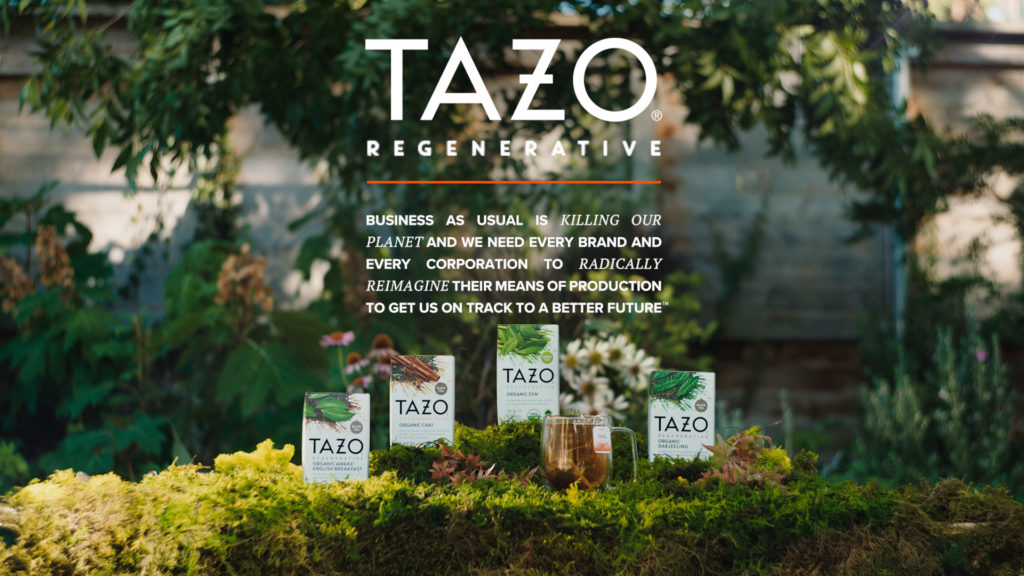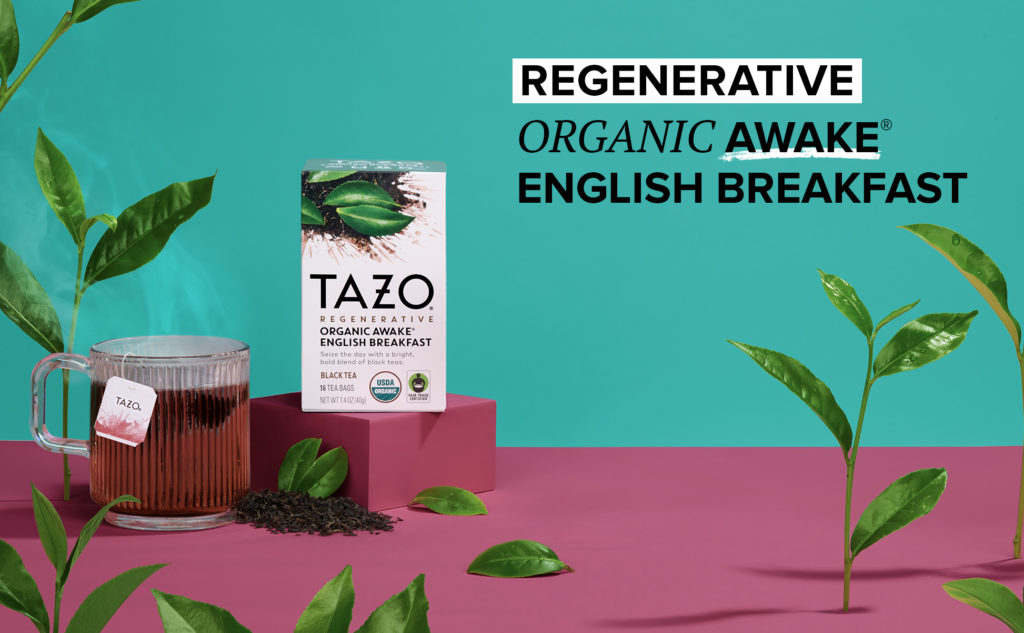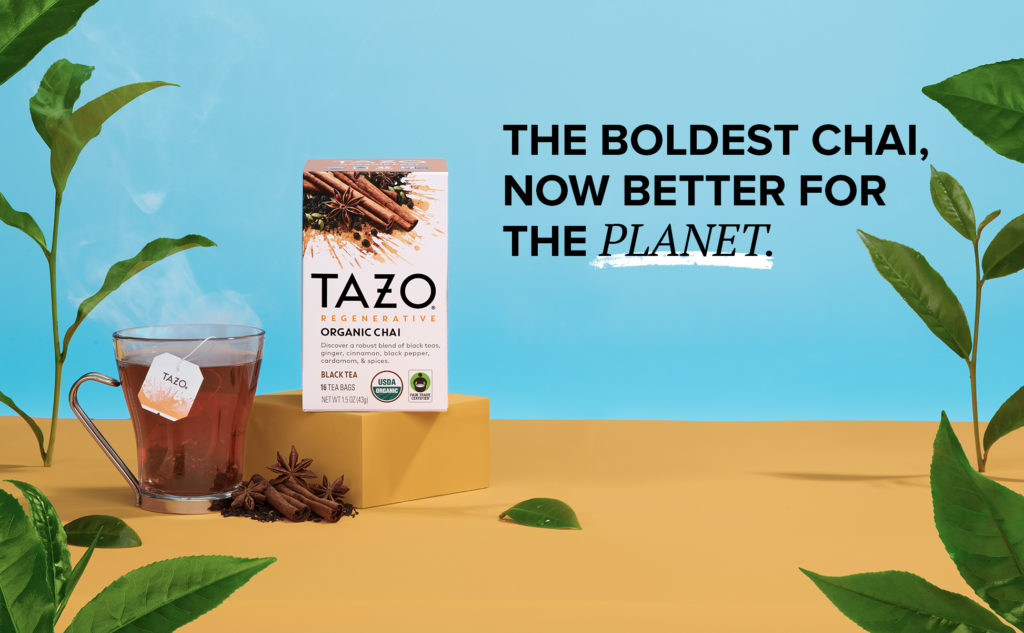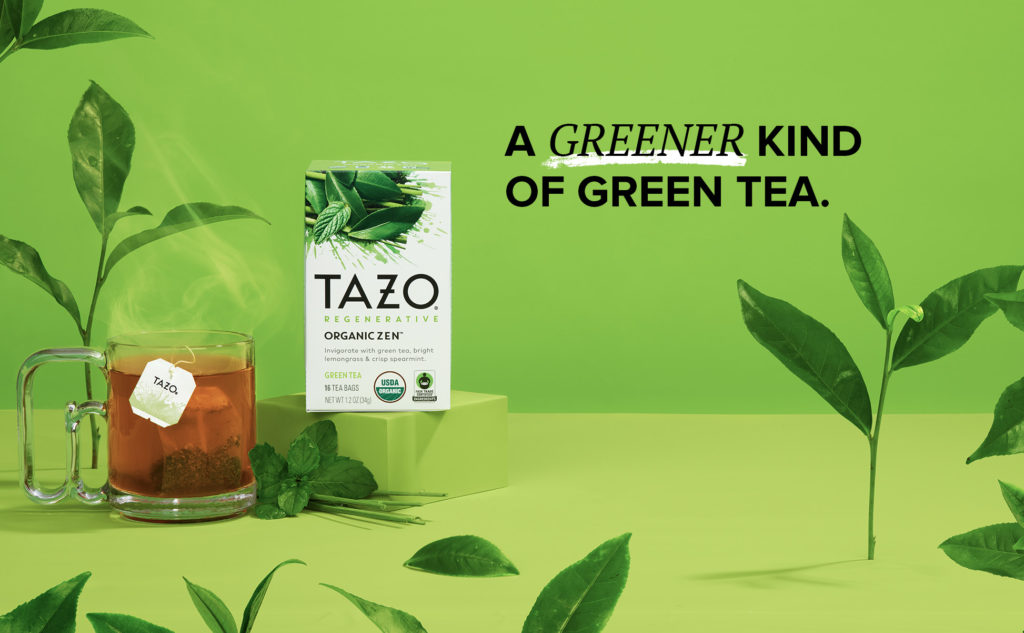Leah Thomas is an environmentalist, activist and author who is doing her part in making the world a better place – literally. The 27-year-old recently published her first novel, “The Intersectional Environmentalist: How to Dismantle Systems of Oppression to People + Planet.” Now, she has teamed up with TAZO as the tea brand embarks on a multiyear “regenerative transformation.”
TAZO’s adoption of regenerative practices strives to prioritize the use of organic ingredients, the protection of soil health, as well as the proper treatment of its workers and farmers. As the brand moves forward, consumers will notice that products are not only USDA Organic certified but also made with Fair Trade USA certified ingredients, as well as Rainforest Alliance certified teas.
“TAZO has always been a brand that challenges the status quo, and this regenerative organic transition is no exception,” said Laraine Miller, President, ekaterra Americas. “For too long, ‘business as usual’ has been killing our planet. It’s time for every company, including the entire tea industry, to overhaul their means of production to combat climate change and help people and the planet thrive.”
21Ninety sat down for an exclusive interview with Leah Thomas who shared why adopting a regenerative organic approach is pivotal for the brand, and why others should also follow suit. As well as how BIPOC can take a greater stance against the climate crisis and more!
Jadriena Solomon: TAZO is “tea brand that challenges the status quo to better society,” And is unveiling its “ambition to become a regenerative brand and a multiyear transition of its tea portfolio to a regenerative organic approach.” What exactly is a regenerative organic approach? And why is this transition for the brand so pivotal?
Leah Thomas: It’s important to first understand that regenerative agriculture is actually several steps above organic agriculture. It focuses on things like soil health, animal welfare, fairness for workers and people in the supply chain – in addition to making sure that ecosystems are restored. So when brands like TAZO say that they are adopting regenerative organic approaches, it means that they’re making sure that people, the planet, and animals are benefiting and being restored in the process. So I think that’s pretty cool, especially for a tea brand.
Sometimes people don’t completely understand all that goes into creating beverages. A regenerative organic approach ensures the protection of the planet and its organisms in the process. Another cool thing to know is that the brand also has a TikTok video which is out right now, and everytime people watch that video, a dollar is donated to the Rodale Institute. This donation will help fund research and farmers’ transitions to regenerative organic practices. And is part of TAZO’s 2022 $1.475M commitment to this transformation.

JS: Wow. That’s cool to know. I think a lot of people assume – because it is a tea brand – that it’s already practicing the best methods to look out for the environment. But it’s nice to see that they’re transparent about the ways they can improve, and putting action behind that.
LT: Yes. Usually people try to assume positive intentions when it comes to the brands that they’re buying from. But it’s also important to make sure that you see those certifications like Fair Trade USA, USDA Organic, etc. A lot of times, if those things aren’t there then that brand hasn’t made a real commitment to both people and the planet. Their supply chain might not be organic and they might not be paying workers fairly, and things like that. That’s why I’m so excited that TAZO is also educating consumers about what it means to be a regenerative brand. Hopefully it will inspire other brands to also adjust their standards.

JS: Right. And why is it a good idea for other brands to also consider a regenerative organic approach with their products, especially as we look ahead and try to create a more sustainable future?
LT: Every brand really needs to take drastic action to help combat the climate crisis. And not only that – but reverse a lot of the damage that’s been done. A lot of people aren’t aware, but agriculture in its current state is actually one of the most destructive industries that’s lending to the climate crisis. And that doesn’t have to be the case.
Utilizing regenerative agriculture can completely have a 180 effect on the planet. And that’s because the way that regenerative agriculture’s being practiced, it isn’t harming the earth. It’s actually helping the earth because there’s a focus on something called carbon sequestration, which basically means that having healthy soil and growing plants with really long roots aids in helping to suck in carbon from the atmosphere. Carbon is a greenhouse gas and farming in that way is actually really beneficial for the planet. So that’s why I think a lot of brands should consider a regenerative organic approach. Unfortunately, with the way agriculture is right now and how brands are operating – it’s doing the opposite and really harming the earth. And I don’t think that should be the case.

JS: How can we push the topics of climate change or become more environmentally aware in the BIPOC community? How do we enforce the notion that environmental issues are very much intersectional with the hard-hitting issues that we deal with on a daily basis like racism and other inequities?
LT: I think reframing what environmentalism is important because a lot of Black and brown folks are already environmentalists in my eyes. When I think of my Black grandmother – she gardens in her backyard, she doesn’t use pesticides or anything like that. Or she reuses plastic bags and repurposes her clothes. So I think there has to be an empowering aspect of this – to acknowledge that we really have been leading the way in sustainable living for decades, if not centuries. So many of our cultural practices are rooted in sustainability and reducing. So it doesn’t have to be stereotypical view that one needs to be this full fledged climate activist to make a difference.
I think another thing, which is a little bit more unfortunate and not as empowering, is to start educating our communities about how social injustice also extends to environmental injustice. Unfortunately the same communities that are struggling with education inequality, criminal justice inequality, structural racism or housing discrimination, are also dealing with air pollution, water pollution, toxic waste, etc. And those things are really impacting our health. And leading to higher instances of asthma and other illnesses within the Black and brown community. So because we are the most impacted by environmental injustice, I think it’s really important to start educating folks about what’s going on in our communities. And getting them to understand that social injustice and environmental injustice are really intertwined.

JS: How can we as consumers discern brands that are actively environmentally conscious and truly deserve our Black dollar? And what steps can we take at this current – big or small – that will make a difference in better caring for our Mother Earth?
LT: I think the small actions that people can do with their consumer behavior is to purchase from brands, like TAZO, with certifications. If we start looking to see certifications on the brands that we’re interested in purchasing, that will help us discern which brands are actually treating people and the planet well. And actually do use organic ingredients, have transparency with the ingredients that they use and are giving back to the people on the planet through their packaging or website, in some way.
It’s very common for brands to participate in greenwashing. They may use words and phrases that sound like the product is green, but if there’s no certification to back it up then there’s no truth there. So looking out for those certifications is really important.
“Available now nationwide, TAZO Regenerative organic teas taste amazing — from the invigorating mix of green tea, spearmint, and lemongrass in TAZO Regenerative Organic ZEN™, to the rich, bold black teas, ginger, cinnamon, black pepper, and cardamon in TAZO Regenerative Organic Chai, TAZO tea experts thoughtfully dreamt up vibrant blends that’ll stimulate the senses and inspire new possibilities.”
